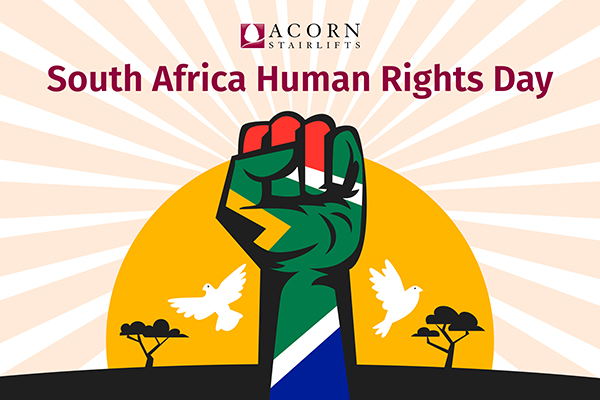Human Rights Day is a poignant moment to reflect on the painful history of all the struggles and triumphs that have shaped the nation's journey towards equality and justice, serving as a reminder of the dangers of discrimination, as well as an opportunity to learn from our past mistakes.
As we honour the heroes of our history who fought and sacrificed in the name of human rights, it's essential to consider how we can actively preserve their legacy and uphold the freedoms they fought for.
Here are five meaningful ways to celebrate Human Rights Day in South Africa, ensuring that we continue to champion equality, honour our heroes, and safeguard our hard-won freedoms for generations to come.
What is Human Rights Day and the History Behind It?
Human Rights Day in South Africa commemorates the Sharpeville Massacre that occurred on 21 March in 1960, when police opened fire and killed 69 people at a peaceful demonstration against apartheid's pass laws in the township of Sharpeville.
This tragedy became a turning point in the fight against apartheid in South Africa, exposing the apartheid government’s deliberate violation of human rights to the entire world.
Human Rights Day serves as a reminder of the sacrifices made in the struggle for freedom, equality, and human dignity in the country.
It also honours the heroes who fought for our liberation, highlighting the importance of upholding human rights for all South Africans.
When is Human Rights Day?
The entire month of March is designated as Human Rights Month in South Africa.
However, the official Human Rights Day is on 21 March—The same day that the Sharpeville Massacre historically took place.
This year, in 2024, Human Rights Day falls on a Thursday.
What is the Theme for Human Rights Month 2024?
The theme for Human Rights Month 2024 is “Three Decades of Respect for and Promotion of Human Rights”.
This theme revolves around the celebration of the implementation of South Africa’s current constitution—the supreme law of the country—on 4 February in 1997, which has been in place for about three decades.
This constitution was drafted by the Constitutional Assembly, which was elected in 1994, shortly after the end of apartheid.
It replaced the previous constitution, which had been in effect since 1961 and was based on discriminatory apartheid principles.
The 1996 Constitution of South Africa has played a pivotal role in shaping the country's post-apartheid era, now hailed as one of the most progressive constitutions in the world.
Human Rights Day also commemorates the country’s commitment to preserving and reinforcing its Bill of Rights, including the following:
Equality
“Everyone is equal before the law and has the right to equal protection and benefit of the law.”
Human Dignity
“Everyone has inherent dignity and have their dignity respected and protected.”
Freedom of Movement and Residence
“Everyone has a right to freedom of movement and to reside anywhere in the country.”
Language and Culture
“Everyone has the right to use the language and to participate in the cultural life of their choice.”
Life
“Everyone has the right to life.”
Significant Ways to Participate in Human Rights Day This Year
1. Raise Awareness with Educational Workshops and Discussions
Commemorating Human Rights Day in South Africa can be effectively done through the organisation of educational workshops and discussions aimed at raising awareness about human rights issues. These events provide valuable opportunities for individuals to deepen their understanding of the struggles and triumphs in the pursuit of equality and justice in the country's history.
By hosting workshops on topics such as apartheid's legacy, the rights of marginalised communities, and the importance of civic engagement, participants can engage in meaningful dialogue and reflection.
Furthermore, inviting guest speakers, activists, or scholars to share their insights and experiences can enrich these discussions and inspire action.
Through these educational initiatives, communities can come together to honour the sacrifices of those who fought for human rights while also empowering individuals to advocate for positive change in their own lives and communities.
2. Move People with Meaningful Messages Through Artistic Expression
Commemorating Human Rights Day in South Africa can be a deeply moving experience through the power of artistic expression.
Art has the ability to transcend barriers, evoke emotions, and inspire action, making it a powerful medium for fostering dialogue and understanding.
By organising art exhibitions, performances, or installations that centre around human rights themes, individuals can create meaningful spaces for reflection and conversation.
Artists can use their creative talents to convey powerful messages about equality, justice, and the resilience of the human spirit.
Whether through visual art, music, theater, or poetry, these artistic expressions have the capacity to move people, challenge perceptions, and foster empathy towards others.
By harnessing the transformative power of art, communities can come together to honour the struggles and triumphs of the past, while also reaffirming their commitment to upholding human rights for all.
3. Commemorative Ceremonies and Tributes
Commemorative ceremonies and tributes hold significant importance in commemorating Human Rights Day in South Africa.
These solemn gatherings provide an opportunity for individuals to come together and pay tribute to the heroes who sacrificed their lives for the cause of human rights and social justice.
Through ceremonies such as candlelight vigils, wreath-laying ceremonies, or moments of silence, communities can honour the memories of those who lost their lives in the struggle against apartheid and other injustices.
Additionally, organising tributes such as memorial services, concerts, or public speeches can serve as powerful reminders of the ongoing fight for equality and dignity.
By coming together in solidarity, South Africans can draw strength from the past and recommit themselves to building a future where human rights are respected and protected for all.
4. Support Human Rights Organisations
Supporting human rights organisations is a crucial way to commemorate Human Rights Day in South Africa.
These organisations play a crucial role in advocating for the rights of individuals, promoting equality, and holding authorities accountable for their actions.
By volunteering time, donating resources, or participating in fundraising events, individuals can contribute to the important work of these organisations in advancing social justice and protecting human rights.
Whether it's supporting initiatives to combat discrimination, promoting access to education and healthcare, or advocating for the rights of marginalised communities, every effort helps to create a more just and equitable society.
Human Rights Day serves as a poignant reminder of the ongoing struggle for freedom and dignity, and by supporting human rights organisations, individuals can actively contribute to building a brighter future for all South Africans.
5. Post, Promote, and Share Human Rights on Social Media
In commemorating Human Rights Day in South Africa, one impactful way to spread awareness and advocate for human rights is through social media engagement.
By posting, promoting, and sharing content related to human rights issues, individuals can amplify important messages and reach a wider audience.
Whether it's sharing informative articles, powerful quotes from human rights activists, or personal stories highlighting the importance of equality and justice, every post has the potential to spark meaningful conversations and inspire action.
Additionally, individuals can use hashtags and tag relevant organisations, such as #HumanRightsDay, to further increase visibility and encourage solidarity within their online communities.
Through social media activism, people can leverage the power of digital platforms to stand in solidarity with those fighting for human rights, both in South Africa and around the world.

